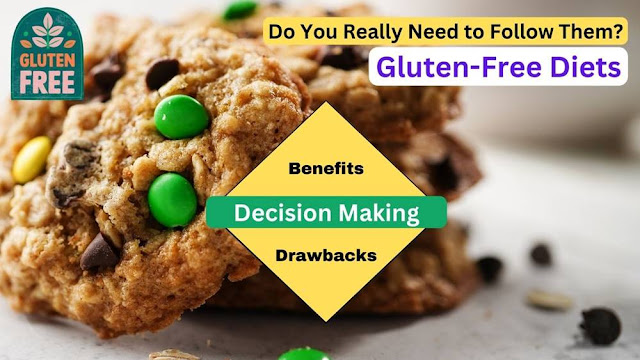In this comprehensive article, we aim to provide you with an in-depth understanding of gluten-free diets and whether you really need to follow them. We'll delve into the science behind gluten intolerance, discuss the benefits and drawbacks of a gluten-free lifestyle, and help you make an informed decision about your dietary choices.
Understanding Gluten Intolerance
Gluten intolerance, also known as celiac disease, is an autoimmune disorder where the consumption of gluten triggers an immune response that damages the small intestine. It affects approximately 1% of the population, and for those individuals, following a strict gluten-free diet is essential for maintaining their health.
The Popularity of Gluten-Free Diets
In recent years, gluten-free diets have gained immense popularity, with many individuals adopting them as a means to improve their overall health and well-being. However, it's important to note that not everyone needs to eliminate gluten from their diet.
Who Should Follow a Gluten-Free Diet?
Individuals with Celiac Disease: If you have been diagnosed with celiac disease, a gluten-free diet is crucial to manage your condition effectively and prevent long-term complications.
Non-Celiac Gluten Sensitivity: Some people may experience symptoms similar to celiac disease when they consume gluten, despite testing negative for the condition. These individuals may benefit from following a gluten-free diet, as it helps alleviate their symptoms.
Wheat Allergy: In cases where individuals are allergic specifically to wheat, avoiding gluten-containing grains becomes necessary. However, it's important to differentiate between wheat allergy and gluten intolerance, as they are distinct conditions.
The Benefits of a Gluten-Free Diet
For those who genuinely require a gluten-free diet, there are several benefits associated with its adoption:
Improved Digestive Health
Following a gluten-free diet can help alleviate digestive symptoms such as bloating, abdominal pain, diarrhea, and constipation in individuals with gluten intolerance. By eliminating gluten, the small intestine can heal, and the digestive system can function optimally.
Enhanced Nutrient Absorption
Gluten intolerance can impair nutrient absorption, leading to deficiencies in essential vitamins and minerals. By adhering to a gluten-free diet, individuals can improve their nutrient absorption and overall nutritional status.
Increased Energy Levels
Many people with gluten intolerance report increased energy levels and reduced fatigue when they eliminate gluten from their diet. This can significantly enhance their quality of life and daily productivity.
Drawbacks of a Gluten-Free Diet
While a gluten-free diet is necessary for individuals with celiac disease and certain other conditions, it's essential to consider the potential drawbacks before adopting this dietary approach:
Limited Food Choices
Several common grains, including wheat, barley, and rye have gluten. Eliminating gluten from your diet can limit your food choices, making it challenging to find suitable alternatives and potentially leading to a monotonous diet.
Nutritional Deficiencies
Gluten-free products often lack essential nutrients like fiber, iron, and B vitamins unless they are fortified. Consequently, individuals following a gluten-free diet must pay close attention to their nutritional intake and ensure they obtain these nutrients from other sources.
Higher Cost
These products tend to be more costly than those that contain gluten. This can put a financial strain on individuals following a gluten-free diet, especially if they rely heavily on processed gluten-free alternatives.
Making an Informed Decision
When considering whether to follow a gluten-free diet, it's crucial to consult with a healthcare professional or a registered dietitian who specializes in gluten-related disorders. They can assess your specific needs and provide personalized recommendations based on your medical history and symptoms.
Remember, self-diagnosis and self-treatment are never advisable, as they can lead to unnecessary dietary restrictions and potentially compromise your nutritional well-being.
Frequently Asked Questions (FAQ)
# Can a gluten-free diet cure celiac disease?
No, a gluten-free diet is the only known treatment for celiac disease. It helps manage symptoms and prevents complications, but it does not cure the condition.
# Is it necessary to follow a gluten-free diet if I suspect gluten sensitivity?
If you suspect gluten sensitivity, it is important to consult with a healthcare professional for an accurate diagnosis.
# Are all gluten-free products healthy?
Not necessarily. While there are many healthy gluten-free options available, some gluten-free products may be highly processed and low in nutritional value.
# Can I consume oats on a gluten-free diet?
Oats themselves do not contain gluten, but they are often contaminated with gluten during processing. Some individuals with celiac disease or gluten sensitivity may react to these contaminated oats. Get certified gluten-free oats to ensure their safety.
# Can a gluten-free diet benefit individuals with other autoimmune conditions?
There is limited scientific evidence to suggest that a gluten-free diet may be beneficial for individuals with certain autoimmune conditions, such as rheumatoid arthritis or multiple sclerosis. However, more research is needed.
#Is it necessary to avoid gluten in personal care products?
Gluten in personal care products, such as shampoo or lotion, is generally not a concern unless you have a skin condition or allergy specifically triggered by gluten. However, if you have celiac disease and are concerned about accidental ingestion, you may choose to avoid gluten-containing products.
# Can children follow a gluten-free diet?
Children with celiac disease must strictly adhere to a gluten-free diet to promote healthy growth and development. If you suspect your child has celiac disease or gluten sensitivity, consult with a pediatrician or a specialist for proper diagnosis and guidance.
# Are there any risks associated with a gluten-free diet?
While a gluten-free diet can be safe and beneficial for individuals with celiac disease or gluten sensitivity, it may pose risks if not properly planned. It can lead to nutritional deficiencies if essential nutrients are not adequately replaced from alternative sources. Working with a registered dietitian can help ensure a balanced gluten-free diet.
Conclusion
In conclusion, a gluten-free diet is crucial for individuals diagnosed with celiac disease or those with confirmed non-celiac gluten sensitivity. For them, consuming gluten can have severe health consequences. However, for the general population without these conditions, there is no scientific evidence to suggest that a gluten-free diet is necessary or provides significant health benefits. If you suspect you have celiac disease or NCGS, it is important to consult with a healthcare professional to receive an accurate diagnosis and appropriate dietary guidance.


.jpg)


.png)
.jpg)

.jpg)





.jpg)
.png)
0 Comments